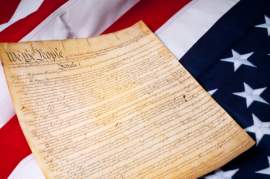
Knowing the Criminal Law and Procedure

Popular In Constitution
Purpose Of Lifetime Appointment And Pros And Cons Enumerated Powers Bicameral Legislature Background Article 3 Of The Constitution We The People 1st Amendment Who Wrote The Constitution Judicial Review Equal Protection Clause 5th Amendment 10th Amendment Three Fifths Compromise
Criminal law and criminal procedure are two important issues that have received a great deal of attention in the Supreme Court of the United States. Criminal law and criminal procedure within the U.S. was initially outlined in the United States Constitution under the Fifth, Sixth, and Eighth Amendments.
The Fifth Amendment explained a person's rights under criminal law pertaining to due process, double jeopardy, self-incrimination, and eminent domain. The Sixth Amendment explained further rights of criminal procedure, giving accused criminals a fair trial by jury, the Confrontation Clause, a guaranteed speedy and public trial, and the right to receive legal counseling. The Eighth Amendment guaranteed those accused of a criminal offense that they will not receive an excessive bail or a cruel and unusual punishment. The Supreme Court saw many notable cases which helped to interpret these important Amendments to the Constitution and ensure the rights of the accused have been upheld.
Criminal Law
Criminal law is the prosecution of an individual by a government who has been accused of committing a crime. A crime is any act which violates public law put into place by local, State and Federal governments. This is in contrast to civil law, which involves individuals, organizations and entities who seek legal action against one another.
In criminal law, a suit is brought up by a prosecutor working for the State in which the crime was committed. When a person is accused and convicted of a crime, the individual may be incarcerated, fined or both. Crimes can include felonies, which are serious crimes such as rape and murder, and less serious offenses such as petty theft, which are called misdemeanors.
Notable Supreme Court Criminal Law Cases
The Supreme Court has heard many cases involving criminal law, many of which have had a major impact on the rights of accused criminals. Below are some of the major cases that have shaped criminal law within the United States:
Miranda v. Arizona
The case of Miranda v. Arizona was a landmark trial for the Supreme Court. In a 5 to 4 decision, the Supreme Court decided that under criminal law, both inculpatory and exculpatory statements made by the defendant as a result of interrogation can only be used in court if the prosecution team is able to prove that the defendant was informed of the right to counsel and a right against self-incrimination before being questioned by police.
The Supreme Court case emerged after Miranda was arrested for the kidnapping and rape of an eighteen-year-old woman. Miranda was interrogated by police officers for two hours before he finally signed a document which confessed to the murders. He was not told of his right to an attorney nor of his right to remain silent.
When the trial began, the prosecutors attempted to use the signed confession as evidence, though Miranda's criminal lawyer objected because he was not aware of his rights during the questioning. The objection was overruled and Miranda was consequently convicted of the rape and sentenced to 20 to 30 years in prison. His lawyer appealed to the Arizona Supreme Court, which eventually reached the U.S. Supreme Court.
Miranda was eventually granted a retrial as the confession evidence was thrown out, and even though he was still convicted with the same prison term, his case made a large impact throughout the U.S. Police officers are now required to read Miranda rights before making arrests of any kind.
Mapp v. Ohio
Mapp v. Ohio was a major decision by the Supreme Court of the United States because it reaffirmed the importance of the Fourth Amendment, a protection which prevents "unreasonable searches and seizures" on an individual in criminal law. In addition, evidence obtained from such unreasonable searches and seizures which are deemed unconstitutional cannot be used in the prosecution of a criminal.
The case involved Dollree Mapp, who was suspected of harboring a known fugitive. When police arrived at her door, they asked to be allowed into the house. Under the advice of her lawyer, she refused. When cops finally forced their way into her house, she demanded to see a search warrant. The police held up a piece a paper that they claimed was the warrant, which was a fake.
After a thorough search of her house, the police did not locate the fugitive, but found a trunk in the basement which they claimed was filled with lewd material against Ohio State law. She was eventually convicted of the lewd material, though she appealed to the Supreme Court of Ohio. When her conviction was upheld, she appealed further to the Supreme Court of the United States.
It was found in the Supreme Court ruling that State laws have not yet had the evidence exclusionary law, even though the Supreme Court had already enforced it in two previous cases. As a result, by a 6 to 3 vote, the case was decided in Mapp's favor and the exclusionary law was put into enforcement on a State level.
Criminal Procedure
Criminal procedure is a set of rules that outlines the process by which a government enforces criminal law. If someone is accused of a crime, from the time that they are arrested to the time they are sentenced involves criminal procedure.
Under the Rules Enabling Act, the Supreme Court of the United States created the Federal Rules of Criminal Procedure. This is used as a guideline for the manner in which Federal criminal trials are held. States have similar procedures as well on a smaller level through their justice systems leading up to the respective Supreme Court of the State.
Notable Supreme Court Criminal Procedure Cases:
Hurtado v. California
Hurtado v. California was a Supreme Court case in 1884 pertaining to the use of grand juries during indictments and the rules that govern it. The case presented the question of whether or not a grand jury is required during a State criminal trial session based on information. The case involved Joseph Hurtado, who found out that his wife was having an affair with another man named Jose Antonio Estuardo. Hurtado eventually fatally shot Estuardo and after he was arrested, he was not granted a grand jury.
According to the Supreme Court, the case did not require a grand jury, and in a decision of 7 to 1, the decision was upheld. Hurtado's due process right was found to not be granted with a grand jury hearing. This proved that the Fourteenth Amendment was not designed to retroactively apply to the Fifth Amendment in the trial of criminals in State jurisdiction.
Massiah v. United States
The Supreme Court case of Massiah v. United States proved that the Government cannot bypass a defendant's lawyer to receive statements from the defendant once a court proceeding in a trial has begun. Massiah, who was indicted on Federal narcotics charges, was asked by a co-defendant to discuss matters in Massiah's vehicle after court proceedings had begun. The Government bugged the car to listen in on their conversation in which Massiah made several incriminating statements. The Government then attempted to use such evidence during his criminal trial.
It was found by the Supreme Court that the Sixth Amendment of the U.S. Constitution is put into effect once the Government begins the prosecution. This Amendment guarantees the right to counsel for an accused criminal and also gives the accused the right to a fair trial. Attempts to obtain incriminating evidence from a defendant is an important part of criminal procedure and cannot be done without the presence of the defendant's lawyer or after the defendant has knowingly given up the right to counsel.
NEXT: What Is The Equal Protection Clause





















